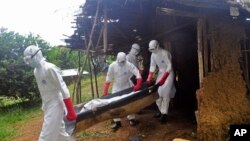The international medical aid group Doctors Without Borders -- also known by the French acronym MSF -- says there have been slight improvements in the Ebola situation in Liberia and Guinea. However, Sierra Leone has experienced a big surge in reported cases throughout the country in recent weeks.
The group released an update on their assessment of the Ebola crisis in the three countries with reports of gains and losses.
“I think we can see the most improvements in Liberia,” said MSF spokesman James Kambaki. MSF has large isolation center in the country and is distributing an estimated 300,000 protection kits – gloves, masks and chlorine as a disinfectant - to the public. “Besides that, MSF has also done a mass malaria prophylactic prevention to try and ease up the burden of other illnesses so that you can concentrate on Ebola.”
Kambaki said the prevention measures appear to be helping, but MSF is investigating a recent drop in numbers being admitted to their Ebola isolation centers.
Another troubling trend he reports is more difficulty in getting public transportation for potential patients. “Most of the taxi drivers who have been bringing patients to the hospital have also been infected and some of them have died. So, the numbers of public transport that use to bring patients to facilities has reduced as well.”
Training in Sierra Leone’s hot spots
Ebola has spread to all of Sierra Leone with new hot spots showing up in the capital, Freetown, and in Port Loko, Bambali and Moyamba. MSF has been conducting training in Kailahun and Bo.
Kambaki said the international response in Sierra Leone has been slow and is not well coordinated. “I think the government response has been hampered by also by the lack of resources and coordination, both at the national and district levels.
“So, there was no strong surveillance system that was put in place.”
In Sierra Leone, where the World Health Orginzation reports more than 4,500 infections and over a thousand deaths, the population of orphans continues to rise.
Surveillance pays off in Guinea
In Guinea, Ebola outbreaks have stabilized some in the capital, Conakry. “The surveillance there is actually working,” Kambaki said. “We are seeing that the cases are not really increasing, but it is still not under control.”.
The non-profit medical emergency organization has been working to avoid an outbreak in neighboring Mali. That country’s first Ebola victim, a two-year-old girl, died in the town of Kaye after traveling from Guinea.
Fear of the Ebola virus continues to pervade the three hardest-hit countries in west Africa, but Kambaki says the fear now focuses on those who have recovered from the virus. He says. “… we are actually seeing also fear of the people who have recovered.”
More than 1,200 patients have recovered and been released from an MSF Ebola isolation center. Neighbors now fear “that this person has had Ebola before and is still going to spread it, which is not true,” said Kambaki.
The families of health workers also fear that because the health workers have been exposed to the virus in isolation centers that they will spread the disease.
Kambaki said there are critical gaps across the board in efforts to contain the Ebola virus in Liberia, Guinea and Sierra Leone. Aid groups are building isolation facilities in all three countries but most centers are not yet ready to serve patients.
There are also gaps in other areas such as personnel to: teach the use of household Ebola protection kits, trace contacts after infections are identified, conduct epidemiological surveiilance, manage referral systems and to mobilize community education campaigns.
“So, I can just say we still need everything in those three countries,” said Kambaki.




